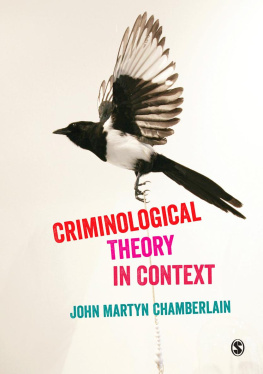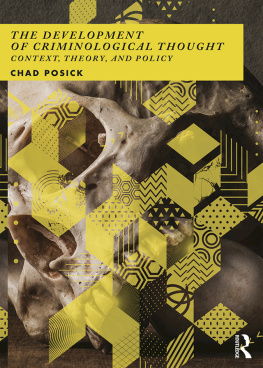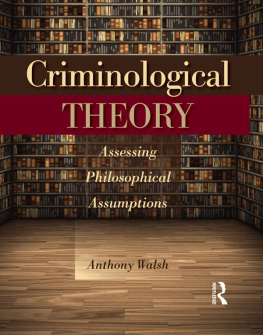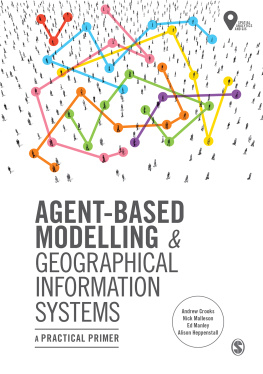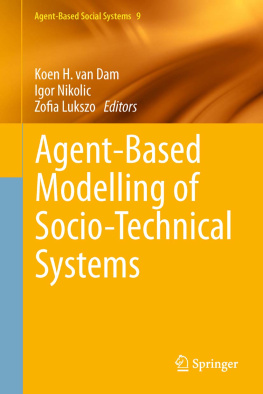Agent-Based Modelling for Criminological Theory Testing and Development allows insights into social problems that are not possible using conventional methodologies. This volume brings together some of the best criminological minds working on agent-based modelling right now. As such, this manuscript is destined to help shape the field for years to come.
Prof. Michael Townsley, Head of School of Criminology and Criminal Justice, Griffith University
Agent-Based Modelling for Criminological Theory Testing and Development is a powerful tool and framework for testing and developing criminological theories. This book covers the simulation of crime patterns and the roles of different agents that influence crime patterns, contributed by the leading scholars in the field of crime simulation. It is a must-read for students, scholars and professionals who are interested in the formulation and what-if analysis of criminological theories.
Prof. Lin Liu, Department of Geography, University of Cincinnati
Agent-Based Modelling for Criminological Theory Testing and Development
Agent-Based Modelling for Criminological Theory Testing and Development addresses the question whether and how we can use simulation methods in order to test criminological theories, and if they fail to be corroborated, how we can use simulation to mend and further develop theories.
It is by no means immediately obvious how results being observed in an artificial environment have any relevance for what is going on in the real world. By using the concept of a stylized fact, the contributors bridge the gap between artificial and real world. With backgrounds in criminology or artificial intelligence (AI), these contributors present agent-based model studies that test aspects of various theories, including crime pattern theory, guardianship in action theory, near repeat theory, routine activity theory, and general deterrence theory. All six simulation models presented have been specially developed for the book. Contributors have specified the theory, identified stylized facts, developed an agent-based simulation model, let it run, and interpreted whether the chosen stylized fact is occurring in their model, and what we should conclude from congruence or incongruence between simulation and expectations based on the theory under scrutiny. The final chapter discusses what can be learnt from these six enterprises.
The book will be of great interest to scholars of criminology (in particular, computational criminologists and theoretical criminologists) and AI (with an emphasis on AI for generative social processes), and more widely researchers in social science in general. It will also be valuable for masters courses in quantitative criminology.
Charlotte Gerritsen is an assistant professor at VU University Amsterdam, Department of Computer Science.
Henk Elffers is a senior researcher at the Netherlands Institute for the Study of Crime and Law Enforcement (NSCR) Amsterdam, and professor emeritus at the Department of Criminal Law and Criminology, VU University Amsterdam.
Crime Science Series
Crime science is a new way of thinking about and responding to the problem of crime in society. The distinctive nature of crime science is captured in the name.
First, crime science is about crime. Instead of the usual focus in criminology on the characteristics of the criminal offender, crime science is concerned with the characteristics of the criminal event. The analysis shifts from the distant causes of criminality biological makeup, upbringing, social disadvantage, and the like to the near causes of crime. Crime scientists are interested in why, where, when, and how particular crimes occur. They examine trends and patterns in crime in order to devise immediate and practical strategies to disrupt these patterns.
Second, crime science is about science. Many traditional responses to crime control are unsystematic, reactive, and populist, too often based on untested assumptions about what works. In contrast crime science advocates an evidence-based, problem-solving approach to crime control. Adopting the scientific method, crime scientists collect data on crime, generate hypotheses about observed crime trends, devise interventions to respond to crime problems, and test the adequacy of those interventions.
Crime science is utilitarian in its orientation and multidisciplinary in its foundations. Crime scientists actively engage with front-line criminal justice practitioners to reduce crime by making it more difficult for individuals to offend, and making it more likely that they will be detected if they do offend. To achieve these objectives, crime science draws on disciplines from both the social and physical sciences, including criminology, sociology, psychology, geography, economics, architecture, industrial design, epidemiology, computer science, mathematics, engineering, and biology.
Edited by Richard Wortley, UCL
Agent-Based Modelling for Criminological Theory Testing and Development
Edited by Charlotte Gerritsen and Henk Elffers
For more information about this series, please visit: https://www.routledge.com/criminology/series/CSCIS
Agent-Based Modelling for Criminological Theory Testing and Development
Edited by Charlotte Gerritsen and Henk Elffers
First published 2021
by Routledge
2 Park Square, Milton Park, Abingdon, Oxon OX14 4RN
and by Routledge
52 Vanderbilt Avenue, New York, NY 10017
Routledge is an imprint of the Taylor & Francis Group, an informa business
2021 selection and editorial matter, Charlotte Gerritsen and Henk Elffers; individual chapters, the contributors
The right of Charlotte Gerritsen and Henk Elffers to be identified as the authors of the editorial material, and of the authors for their individual chapters, has been asserted by them in accordance with sections 77 and 78 of the Copyright, Designs and Patents Act 1988.
All rights reserved. No part of this book may be reprinted or reproduced or utilised in any form or by any electronic, mechanical, or other means, now known or hereafter invented, including photocopying and recording, or in any information storage or retrieval system, without permission in writing from the publishers.
Trademark notice: Product or corporate names may be trademarks or registered trademarks, and are used only for identification and explanation without intent to infringe.
British Library Cataloguing-in-Publication Data
A catalogue record for this book is available from the British Library
Library of Congress Cataloging-in-Publication Data
A catalog record has been requested for this book
ISBN: 978-0-367-22852-1 (hbk)
ISBN: 978-0-367-52407-4 (pbk)
ISBN: 978-0-429-27717-7 (ebk)
Typeset in Times New Roman
by Newgen Publishing UK
Contents
Charlotte Gerritsen and Henk Elffers
Toby Davies and Daniel Birks
Verity Tether, Nick Malleson, Wouter Steenbeek, and Daniel Birks
Elizabeth R. Groff and Jennifer Badham
Wouter Steenbeek and Henk Elffers
Eric Arajo and Charlotte Gerritsen




